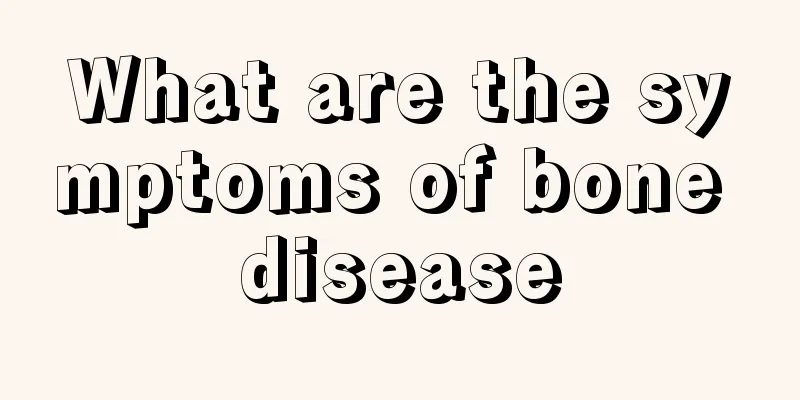What are the symptoms of bone disease

|
Femoral head necrosis is a very common disease in life. Most patients are middle-aged and elderly people. Because people will naturally have osteoporosis when they reach middle age, and gradually due to the low physical fitness of the elderly, it is easy for them to cause some bone diseases. Bone lesions will first make the elderly feel bone discomfort and difficulty in movement. So what are the symptoms of bone lesions? There are often no clinical symptoms in the early stages of femoral head necrosis, and it is difficult to detect on X-rays. Usually the earliest symptoms are hip or knee pain, dull pain, or soreness and discomfort, and the pain may be continuous or intermittent. The early pain is usually not serious. It worsens after activity, eases after rest, and suddenly worsens after trauma. It can be temporarily relieved by oral medication and rest, but it often recurs. It is recommended that you have a CT scan or MRI when you go to the hospital for treatment, which will be more helpful in the diagnosis of femoral head necrosis. If it is indeed femoral head necrosis, early treatment is very likely to cure it. For example, you can insist on taking blood-activating and blood-stasis-removing drugs for a long time, and you can also do some physical therapy, acupuncture, rehabilitation exercises, etc. ①Pain. The pain may be intermittent or continuous, worsening after walking or activity, and sometimes pain at rest. The pain is usually tingling, dull or sore, often radiating to the groin, inner thigh, back of buttocks and inner knee, and may be numb in the area. ②Joint stiffness and limited movement. The patient has difficulty in flexing and extending the hip joint, has difficulty squatting, cannot stand for long periods of time, and walks like a duck. Early symptoms include significant limitation of abduction and external rotation. ③ Limping. It is a progressive shortening claudication caused by hip pain and femoral head collapse, or hip subluxation in the late stage. Intermittent claudication often occurs in the early stages, and is more obvious in children. ④Physical signs. Local deep tenderness, tenderness at the adductor muscle insertion, positive 4-word test, positive GABA sign, positive A11is sign, and positive TKDele-Uq test. Abduction, external rotation or internal rotation is limited, the affected limb may be shortened, muscles may atrophy, and there may even be signs of subluxation. Sometimes axial thrust pain is positive. ⑤X-ray manifestations. The bone texture is fine or interrupted, and the femoral head is cystic, sclerotic, flat or collapsed. |
<<: Symptoms of terminal ileal ulcer
>>: What are the symptoms of heavy intestinal moisture
Recommend
What's wrong with my hands being numb and tingling
When we carry something heavy on a certain part o...
What are the dangers of using a second-hand breast pump?
Mothers who are breastfeeding often need to use a...
How to protect your vocal cords
People mostly communicate using words in their da...
Will you die from mid- to late-stage tongue cancer?
Will patients with mid- to late-stage tongue canc...
It is necessary to do a good job in preventing uterine cancer
After suffering from uterine cancer, it is very h...
Is it good for your health to drink purified water for a long time?
In our daily life, purified water is the most con...
What to do if blisters appear in mouth
When summer comes, the temperature will rise rapi...
Can breast cancer patients eat konjac?
Can breast cancer patients eat konjac? 1. Breast ...
Flowering buns
Of course the main ingredient of the flowered ste...
What are the causes of high fasting blood sugar?
Generally, blood sugar measurement needs to be do...
Can you still eat expired seasonings?
Seasonings that are expired should generally not ...
How to recover from lung cancer? Five recommended diet recipes for lung cancer
Lung cancer is a very scary disease for many pati...
How long is the best time to dry quilts in the sun in summer
We cover ourselves with quilts every night, so th...
Can pregnancy be detected after one week of intercourse?
If no contraceptive measures were taken before ha...
What is the best way to treat advanced lung cancer
The treatment of advanced lung cancer is mainly c...









